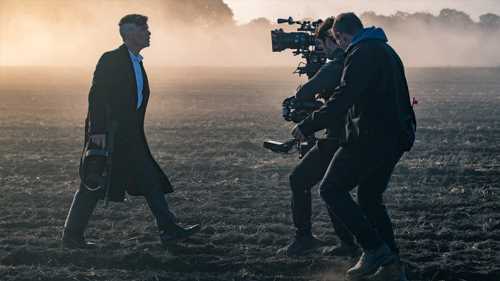UK Film & TV Covid Restart Scheme Will Cost Gov’t Just $25M While Generating $2.8B For Economy, Report Says

The UK’s Film & TV Production Restart Scheme (PRS) will end up costing the government just £20M ($25M) while generating more than £2.25B ($2.8B) for the nation’s economy, according to an independent report analyzing its success.
The final figures published in the report said the £500M PRS will end up paying out less than £50M to producers – under one-tenth of its initial value – who required insurance cover for Covid-19-related losses. The scheme, which was administered by the BFI and private insurers, collected £35.6M via premiums. This means a government deficit of £19.6M when administration costs are taken into account, the report said.
Related Story
BFI To Invest $8m In Audience Engagement Projects
At time of publication, the UK’s Department for Culture, Media and Sport hadn’t responded to our request for comment over how much of the £50M has been paid to producers. In February, a Deadline investigation revealed the PRS had paid out just over half of the claims it had received, around £28M. We spoke with several producers who had been waiting months to receive their claims.
Celebrated by multiple senior government ministers and the likes of BBC Chair Richard Sharp, the PRS was forged in summer 2020 by then Chancellor of the Exchequer Rishi Sunak (now Prime Minister) to help fill the gap created by the lack of available insurance. Producers would sign up to the scheme prior to entering production and, if any issue marred their productions and led to additional costs, they would be able to submit a claim for reimbursement.
Today’s report, which was carried out by global analysis outfit Nordicity and accountancy firm Saffery Champness LLP, said the scheme had boosted the UK economy by £2.25B by allowing shows and films to re-enter production.
It created more than 100,000 jobs and supported more than 1,200 productions, inucluding the likes of BAFTA nominees Brian & Charles, Blue Jean and Good Luck To You, Leo Grande, along with high-end dramas Gentleman Jack, Peaky Blinders and His Dark Materials.
The PRS was “by all accounts effective from an economic perspective,” said the report, which claimed that the total benefits generated were 115 times greater than the cost of delivery.
Notably, the PRS was used far more by high-end TV (HETV) producers than film. According to the report, 52% of all HETV shows during the scheme’s two-year period registered with the PRS, compared with 29% for films, amounting to 179 HETV shows and 87 movies.
The most common genre using the scheme was factual and documentary series, which totalled around half, although these shows tend to cost less than scripted.
The report said: “Looking across all genres of production, the tremendous uptake of the Scheme among HETV producers – both on an absolute and market share basis – can be put down to some of the key features of the cover it offered.”
After October 2021, when the premium to access the scheme rose from 1% to 2.5% of a project’s budget, PRS users dipped dramatically, the report added, with the 2.5% seen as “prohibitive,” especially for smaller producers. “Whilst there was a steep drop in the levels of Scheme uptake following the rate increase, it can be viewed as a positive outcome where productions were able to go ahead in the absence of the scheme,” the report said.
A survey of scheme users found 87% were happy with its impact on the company’s financial sustainability while 66% reported making more innovative film and TV content after signing up. Just over half said it allowed them to “create content that generated sales and distribution outside the UK,” although only 36% said the scheme had given them the chance to “produce content with a more diverse key creative team.”
Today’s report, which comes several months after the scheme’s closure, also pointed out that broadcasters and producers faced much more risk than streamers due to the lack of Covid-19 insurance.
“The global SVoDs entered the pandemic with existing blanket insurance policies that had several months or even years left on them and provided coverage for COVID-19 risks,” it added. “For the global SVoDs, therefore, as soon as film and TV production was reopened in the UK or other jurisdictions, they could resume or begin filming.”
While broadcasters were able to grow audience share once the scheme came into effect, the report pointed out that the pubcasters “did not point to the Scheme, per se, as being a key factor in maintaining their engagement with audiences.”
UK Culture Secretary Lucy Frazer said: “When the pandemic threatened that success we stepped in to protect jobs, keep cameras rolling and ensure our producers could keep making the exceptional content that the UK is famous for. The Film and TV Restart Scheme protected productions that supported jobs, contributed to our economy and entertained audiences across the world.” Frazer is now overseeing an overhaul of UK broadcasting legislation that includes streamers being regulated in line with the PSBs for the first time.
With the scheme now closed, UK TV and film producers were left disappointed by a small 0.5% real-terms increase in the nation’s hugely popular tax credit, delivered in last month’s budget. Producers had been hoping for a much larger increase to mitigate spiralling budgets.
Must Read Stories
Lineup, Analysis & Fest President’s First Speech; HBO’s ‘The Idol’ Gets Croisette Premiere
Disney & Marvel’s ‘Guardians Of The Galaxy Vol. 3’ Tracking To $130M U.S. Opening
‘Scream’ Star Melissa Barrera & Radio Silence Reunite On Secret Monster Movie For Universal
Peabody Noms: ‘Abbott Elementary,’ ‘Better Call Saul’ & More; PBS Leads Field
Read More About:
Source: Read Full Article



